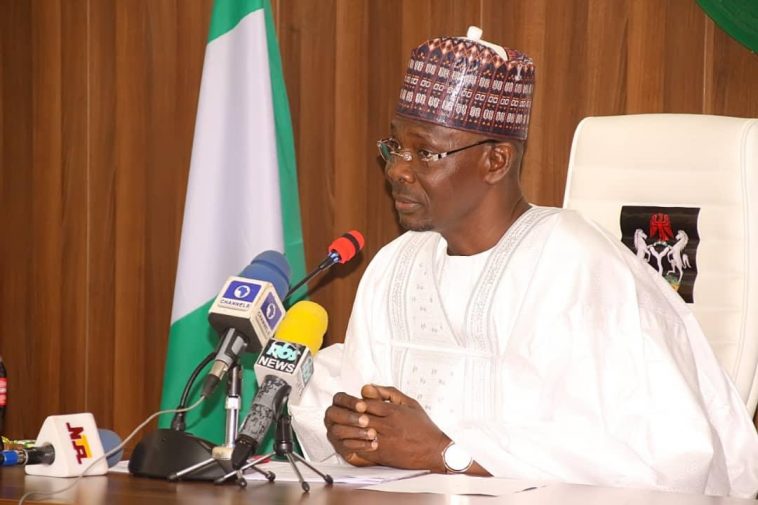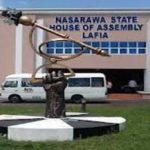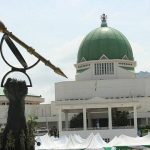In a letter dated June 5, 2023, and exercising his constitutional right as enshrined in Section 105, Subsection 3, of the 1999 Constitution as amended, Governor Abdullahi A. Sule had written to the Acting Clerk (AG) of the Nasarawa State House of Assembly (NSHA), Ibrahim A. Musa, and issued a proclamation and announced Tuesday, June 6th, 2023, the first session of the 7th Assembly. In a twist of events, the AG Clerk announced the postponement of the inauguration on the said date, citing security reasons. It did not take long before the House of Assembly Complex on Shendam Road was sealed in Gestapo style and heavy security was deployed.
Although the AG Clerk created the impression of a security problem, it was rumoured that the Governor and his team lost out in the number game to elect the speaker and his deputy. The Governor is supporting the candidature of Rt. Hon. Balarabe who has been the speaker of the NSHA for the past eight (8) years and is contesting for a third time. Balarabe enjoys the support of nine out of 24 members. On the other hand, his main challenger, Hon. Daniel Ogah Ogazi, representing Kokona Kokona East Constituency, enjoys the support of 13 members, including himself. Incidentally, both Balarabe and Ogazi are members of the All Progressive Congress (APC) and from the same senatorial district (Nasarawa West).
The whole drama culminated in the election of two speakers. Balarabe-Abdullahi, who enjoys the support of nine members, was elected at a sitting that took place at the Ministry for Local Government and Chieftaincy Affairs in the state. Ogazi emerged as Speaker from the proceedings at the State Assembly complex with the support of 13 members. We are now back to the period where 16 is greater than 19. What is ironic about the debacle happening in Nasarawa State is that the AG Clerk, who had announced the postponement of the inauguration for security reasons, swore in Balarabe as the speaker and enjoyed the support of security agents.
Within the week, major newspapers and social media were awash with the mild drama that took place at the Benue State House of Assembly, Makurdi, venue for the inauguration of the 10th Assembly. After the hubris and political horse-trading, Aondona Dajoh, a candidate for the Governor, was elected speaker, having polled 17 votes on the second ballot and defeating his closest rival, Mrs Becky Orpin, who scored 15 votes. Mrs Becky is the candidate of the new Secretary to the Government of the Federation (SGF), Senator George Akume. What happened at the Benue State House of Assembly is democracy in action; despite their differences, a winner emerged, and the state has moved on with the winning side celebrating while losers lick their wounds and re-strategize for the next battle. The happenings in Lafia and Makurdi sum up the tragedy of Nigeria and her leaders. The average Nigerian politician suffers from the terrible malaise and disease of wanting absolute control of power. For an election of principal officers that will be decided by an elected few, there is so much drama. Nigerian politicians are the gifts that keep giving.
In a move reminiscent of Jacob’s voice and Esau’s hand, Governor Sule played host immediately to the Balarabe-led faction at the Government House. The governor has not learned his lessons. In the aftermath of the House of Representatives APC primaries, which were marred by controversy and subsequent cancellation by the National Working Committee (NWC) of the APC, Governor Sule played host to some of the alleged winners of the primaries. Some of them later lost the tickets at the courts. The governor immediately playing host to the Balarabe-led faction has shown that he is the architect and the brain behind the crisis in the State House of Assembly and has demonstrated that he is not a democrat, a progressive, or against the rule of law. Governor Sule had promised to industrialise Nasarawa State, secure lives and properties, and bring about development. With the happenings in the state, which investor will be willing to put his money in a state where the governor does not understand the principle of separation of power? Which businessman or woman will put their money in a state where the number one citizen does not understand simple arithmetic and thinks 9 is greater than 13? Which conglomerate will want to put its money in a state where there is no accountability, probity, or public trust? The governor today surrounds himself with people of questionable character; he wines and dines with the corrupt, and when you are caught, Sule will elevate you and post you somewhere else. The outgone Accountant General of the state is a prime example.
Since Sule became governor in 2019, I have always wondered and asked myself: what is his leadership style, what principles does he hold dear, where and when can he draw the line, and what is he doing to groom the next generation of leaders in the state? We can talk about the likes of Seyi Makinde, who gave young people an opportunity in government, and they performed excellently. He has a knack for selecting young, smart, innovative, and forward-thinking citizens to work with. The same cannot be said of Nasarawa. What is more painful in all of these is that the supposed leaders of tomorrow choose to support and celebrate the illegality and impunity ongoing in the state without pondering the repercussions on their future or that of the next generation. These are precarious times for our dear state.
For a governor, under whose watch the APC lost the three senatorial seats and two out of five House of Representatives seats, one would expect that he would embark on a journey of building bridges and uniting aggrieved party members ahead of possible future elections; rather, he has focused his time and attention on the mundane to the detriment of his person, reputation, and that of Nasarawa State. For someone who is coming from the private sector, where things are seen to be done rightly, one would think that the governor would replicate the same in governance; alas, we were wrong. Governor Sule’s action has further reinforced the saying that “all politicians are the same”. It does not matter whether they have worked at Dangote or Sadiq Petroleum, in the US or Europe. They are only after power—absolute power—without thinking of the repercussions or damage that would be done to their person. Democracy is our adopted system, but autocracy is what we practice in the real sense of it.
Nasarawa State requires the urgent attention of the Governor, and he needs to hit the ground running. We lag in most indices of human development. The 2022 Budget State of State report shows that, in 2021, Nasarawa State had a total domestic and foreign debt of N51.10 billion and $56.88 million, respectively, while recurrent expenditure gulped 58.91%, with the remaining 36.54% going to capital expenditure. Even our generated IGR is not sufficient to cover personnel costs, let alone overheads, a sign that all is not well with our finances and that we are yet to wean ourselves off the monthly allocation from Abuja. Unemployment in Nasarawa State is above 30%, the incidence of monetary and multidimensional poverty is 24.3%, and the poverty rate is 57.3%. We rank 12th and 2nd regarding poverty rates in Nigeria and the North-Central, respectively. Over 187,000 of our children are out of school; the state of the infrastructure in our public schools is nothing to write home; and the requisite human resources are lacking. State-owned higher education institutions are grossly understaffed, and where you have staff, they are not qualified to teach and train the next generation of leaders, thanks to employment by political patronage. The healthcare system in Nasarawa State is in a coma and needs urgent resuscitation. We currently have between 400 and 500 doctors and dentists in the state to cater to a population of over 2 million. The under-5 mortality rate is currently estimated at 65 deaths per 1,000 live births, far below the 20 deaths per 1,000 live births targets of the UN Sustainable Development Goals. I can go on and on.
What the foregoing shows is that our governor has his work cut out for him. The myriad of challenges confronting the state should be what preoccupies his mind morning, afternoon, night, and even when he is in the “other room”. Nasarawa State and her people deserve better and should get better. For a state that shares proximity to Abuja with abundant solid mineral deposits and a large swath of land (one of the highest land areas per capita in the country), we should be competing on all fronts and should rank better in all indices of human development.
To change the trajectory of our state, there must be institutional and structural reforms, beginning with the charade that took place in Lafia. The House should be properly convened and let members choose who will be their speaker and deputy speaker. Everyone who played a treacherous role in the show of shame must be arrested and persecuted according to the laws of the land. To avoid a repeat of the drama we see every four years, there is a need to amend our constitution and remove that section that empowers governors to proclaim the inauguration of State Houses of Assembly. Every institution and practice that has placed structural roadblocks in the path of our democracy must be dismantled. The only way to do that is to disempower the few who lord themselves over the many. The AG clerk should be arrested and persecuted immediately, and the Inspector General of Police must discipline the Commissioner of Police in Nasarawa State for providing security cover to the Balarabe-led faction.
“In their book, ‘How Democracies Die’, Steven Levitsky and Daniel Ziblatt argue that while there is a general tendency to believe that democracy is imperilled only by military adventurers, it is now the elected leaders who most often subvert the very process that brought them to power. These are men who have no qualms about “rewriting the rules of politics to permanently disadvantage their rivals”, the authors wrote before adding, “The tragic paradox of the electoral route to authoritarianism is that democracy’s enemies use the very institutions of democracy—gradually, subtly, and even legally—to kill it.” (Olusegun Adeniyi).
It is in the enlightened self-interest of the governor, Sule, to tow the path of honour and focus on leaving a lasting legacy so history can be kind to him. As it stands, if he is to leave office today, he will be remembered as the engineer governor who agreed that 9 is greater than 13 and tried to set the state on fire.
A word is enough for the wise. As our elders tell us, it is only the stubborn fly that follows the corpse into the grave. To say more would be otiose. Governor Sule, focus on delivering your campaign promises to the people of Nasarawa State.






